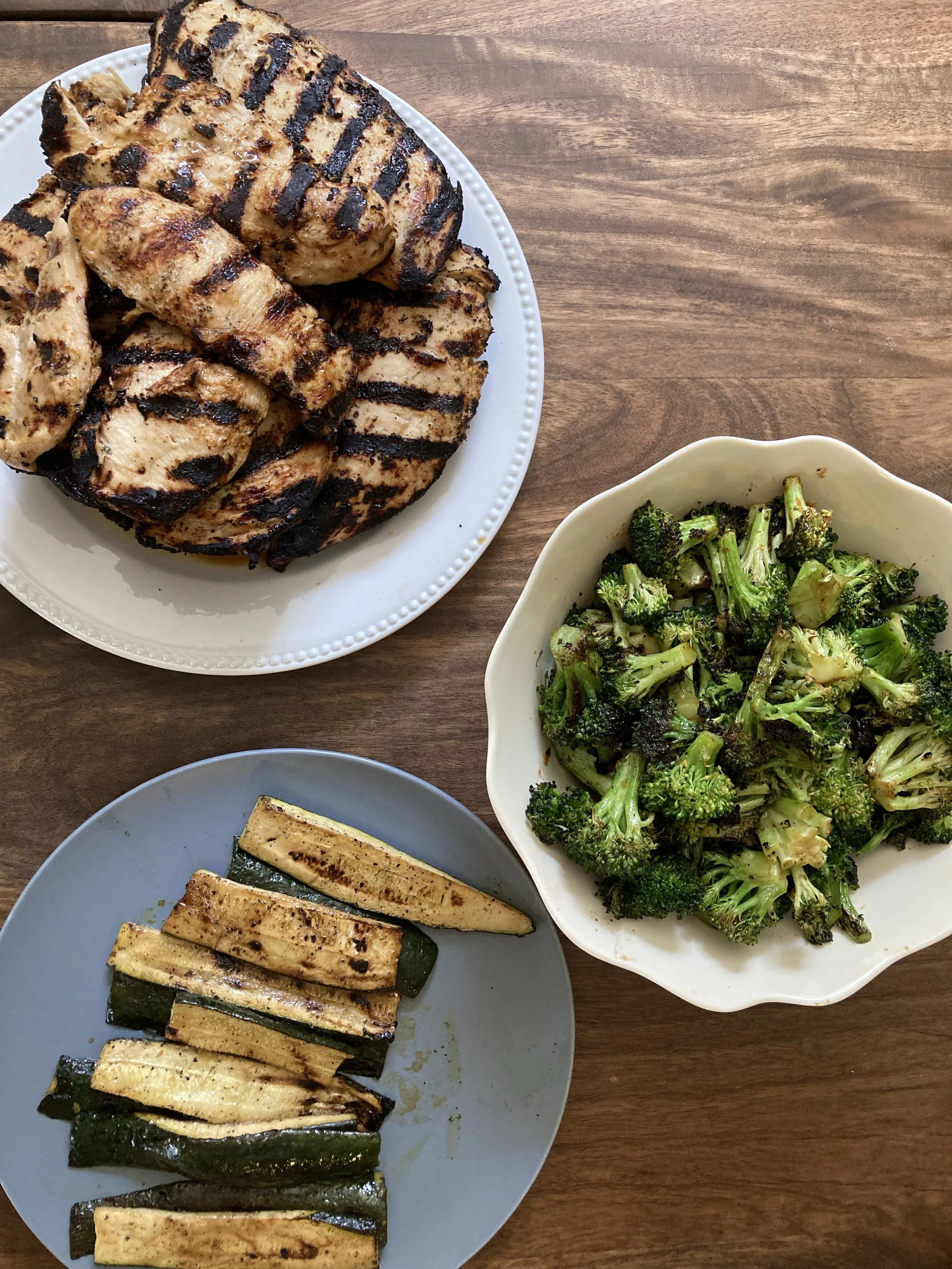Simple ways to keep your nervous system healthy
Trying to optimize and support your brain health?
Here are 10 things you can start today to bring holistic health to your nervous system!
In 2020 JAMA published a study showing how neurological disorders (think things like alzheimer's disease, parkinson's disease dementia, neuropathy, etc.) are on the rise. And while some of these have a genetic component, they are also influenced by our environement and lifestyle. This means that our daily life can affect our future neurological health.
This post shares 10 things you can implement to help support your nervous system health (and you'll see that a lot of them contribute to an overall healthy life)!
What is the nervous system?
The nervous system is a complex system throughout the body including the brain, spinal cord, and nerves. It is responsible for processing sensory input from the 5 senses- sight, smell, taste, touch and sound! As we age, these senses can become diminished. Other things that effect your nervous system are poor nutrition, stress, and toxin overload to name a few.. The good news is that there are things we can do to help support our body, nervous system, and quality of life!
10 Things To Help Support Your Nervous System
We are all about simple and sustainable health over here. So here are some easy ways you can implement healthy habits into your day to day life in order to support and protect your nervous system!
1. Get in Touch
..with the earth! That's right. Grounding is one of my favorite (free!) wellness activities to incorporate into my daily routine.
Studies show that contact with the earth- either barefoot feet on the ground or grounding devices- can help to regulate your nervous system, decrease inflammation, help with pain, and stress management. Some easy ways to incorporate grounding include:
walking barefoot on grass, dirt, or concrete
touching or swimming in water
grounding shoes (i’ve owned Earthrunners for 3 years now and loove them)
2. Support your nervous system with healthy fats
For a long time fats were demonized. But thankfully, we are past the low-fat, fat-free diet craze and people are recognizing the health benefits of healthy fatty acids. The nervous system especially benefits from healthy fats in our diet- i mean, the brain is literally made of mostly fat.
Some of my favorite sources of healthy fats:
extra-virgin olive oil (you want to look for cold-pressed and stored in a dark bottle-preferably glass)
grass fed butter
coconut oil
fatty fish (as if I needed an excuse to eat more sushi )
3. Move your body
Increasing your heart rate through fitness not only helps to keep your heart strong and healthy-- but the increased blood flow keeps your nerves healthy too! When your heart rate and blood pressure increases with regular exercise, more blood is pushed quicker through your blood vessels and more nutrients are brought to your cells.
Regular physical activity does not require a fancy gym membership or tons of equipment. Some of my favorite ways to stay active and healthy are :
taking walks outside
hiking
doing yoga (it's hard making it to classes these days so I love free videos on youtube)
body weight strength training (squats, lunges, pushups, pull ups)
Staying active supports more than just your nervous system— movement and exercise helps to release endorphins, support dopamine levels, boost heart health, build muscle, improve sleep, builds confidence, and is a foundational element to a holistic lifestyle.
4. Nourishment
Beyond a healthy diet of fats, carbohydrates, and protein, we want to make sure that our foods are MICROnutrient rich. That means packed full of vitamins (b vitamins are especially crucial for brain health) and minerals!
My favorite ways to make sure I’m getting plenty of nutrients:
focusing on nutrient dense foods - this means that per calorie, the food is packed with nutrients. The opposite would be nutrient void foods that are high in calories without many nutrients. An easy rule of thumb is whole foods that are found in nature are much more nutritious than those processed and found in packages.
Eat colorfully - red fruits and vegetables are full of vitamin c, antioxidants, and lycopene while green produce has cancer- fighting compounds called sulforaphane and indoles. So try to incorporate a lot of variety and colors into your meals!
Some of my favorites are well-sourced animal proteins like eggs and meat, leafy greens, and organ meats (i promise, it can be so much easier to incorporate them than it seems!) These whole foods can make up a well-balanced diet that will support your entire body.
Related Reads:
5. Balancing Caffeine Intake
Don't worry-- I'm not saying to cut out your coffee. But maybe cut out your 2nd, 3rd and 4th cups. And if you love your coffee (hii, that's me) there are ways to support your body to handle the caffeine easier
That looks like always drinking caffeine AFTER you have eaten a meal, making sure the caffeine is not keeping you awake and getting enough sleep,
If you love the ritual of coffee, but don't love the effects of caffeine personally, some other tasty alternatives are:
herbal teas (opt for organic when you can! I love the affordable options Thrive Market carries)
green tea
decaf coffee (it actually still has caffeine, but in much smaller amounts)
trying a mushroom coffee- when I experimented with eliminating caffeine from my diet, I tried MudWtr and loved it. Don’t let the name throw you off- imagine a hot chocolate chai drink packed with ayurvedic herbs and adaptogens to give you energy without the jitters
Related Reads
6.Balance your blood sugar
We talk about blood sugar balance quite a bit around here-- and for good reason! Uncontrolled blood sugar can have profound effects on the body. It not only leads to chronic illness such as diabetes, but effects everyday life. High blood sugar levels damage the small capillaries and ultimately limit blood flow-- that is why people with diabetes have poor wound healing and are at risk for neuropathy- because those tissues are not getting sufficient blood flow
So in order to keep your blood vessels healthy, and protect the health of your nervous system, make sure you are balancing your blood sugar. In addition to good nutrition, there are some simple ways to find more balance:
pair carbohydrates with healthy fats and protein
opt for natural carbohydrate sources over packaged ones (these ones come with fiber and nutrients that slow the release of sugar in the blood stream)
try to avoid or limit refined sugars
share a dessert! i am all about balance over here. That means I'm going to enjoy dessert on occasions and not regret it. But i'll also probably opt to share a serving with my husband because tons of sugar just don't make me feel great 🤷🏻♀️
7. Stay mentally fit!
Just as important as lifting is for keeping your muscles strong and healthy, so is working out your brain! Keeping your mind engaged and stimulated helps to keep the neural connections strong and healthy. It's like the ol saying- if you don't use it you lose it. Some of the best ways to work on your brain health are:
word searches, crossword puzzle, sudoku, jigsaw puzzles.. all the things that keep your brain stimulated and engaged
practicing your memorization skills (this helps fight against memory loss with age too)
All of these help to increase cognitive function and support your nervous system!
On that same note, try to limit the activities where your brain is NOT engaged. *cough cough* mindless scrolling on Instagram, binge watching netflix, or getting lost in the TikTok algorithm. That's not to say they are inherently bad for you- just keep it balanced :) Recently, I have been loving this idea of a “Dopamine Menu” to intentionally curate the things I want to get dopamine from, not just giving in to habits that are not really serving me long-term.
8. Sleep
Did you know that when you are sleeping, your body is working to heal your body and protect it from illness, destroy cancer cells, build muscle, regulate metabolism, and support your immune system. Good sleep is one of the most important things you can do to support good health!
And it goes beyond just hours of sleep, but it means getting quality sleep.
I've shared my bedtime routine, and it's honestly been the most impactful thing in helping me to sleep soundly (even with two children and a baby still nursing throughout the night!)
Some big hitters in ensuring quality sleep-
set the mood (and dim those bright lights!)
create a relaxing ritual- breath work, candles, a bath, whatever gets you calm and relaxed and ready for sleep
nourishing bedtime snack
9. Manage stress levels
This is a category I work with all of my coaching clients on. Because the truth is, most people are living in a state of chronic stress. This leads to poor mental and emotional health, a weakened immune system, weight gain, and so much more.
Here are some of my favorite strategies to help during times of stress:
box breathing is a quick and easy deep breathing exercise I like recommending to clients. Yous tart by inhaling for 4-6 seconds, holding for the same amount of time, and then exhaling over the same amount of time. For example: inhale over 4 seconds, hold for 4 seconds, exhale for 4 seconds, and then pause for 4 seconds before inhaling again. You can continue this cycle until you find a rhythmic, meditative state.
Studies have shown that this practice helps to reduce cortisol levels, improve sleep, and decrease subjective feelings of acute stress.
journaling
mindfulness practices
10. Minimize your life
Minimalism isn't just about your physical space- but your mental and emotional health too! When you have less stuff, that means less to upkeep, replace, and put away. There are fewer things you mentally need to keep track of.
You can take it one step further and minimize all the extra things on your to do list as well. The purpose isn't to live a boring life, but to create more space for doing the things you looove. For me this looked like saying goodbye to chiropractic care for a season. It ended up being more stressful to pack up the kids and get to the appointment than the benefits I was seeing from going. So I started looking at the appointments I was making in a similar light-- are they actually worth the time, energy, and finances they were taking from my life. Or could I spend that time doing something I loved?
There you have it- 10 things that you can implement into your routine today to help support your nervous system holistically!
‘til next time
Kaelyn














Looking for a natural fiber underwear brand that ACTUALLY fits and is comfortable? Today I am sharing my favorite go-to underwear brand!